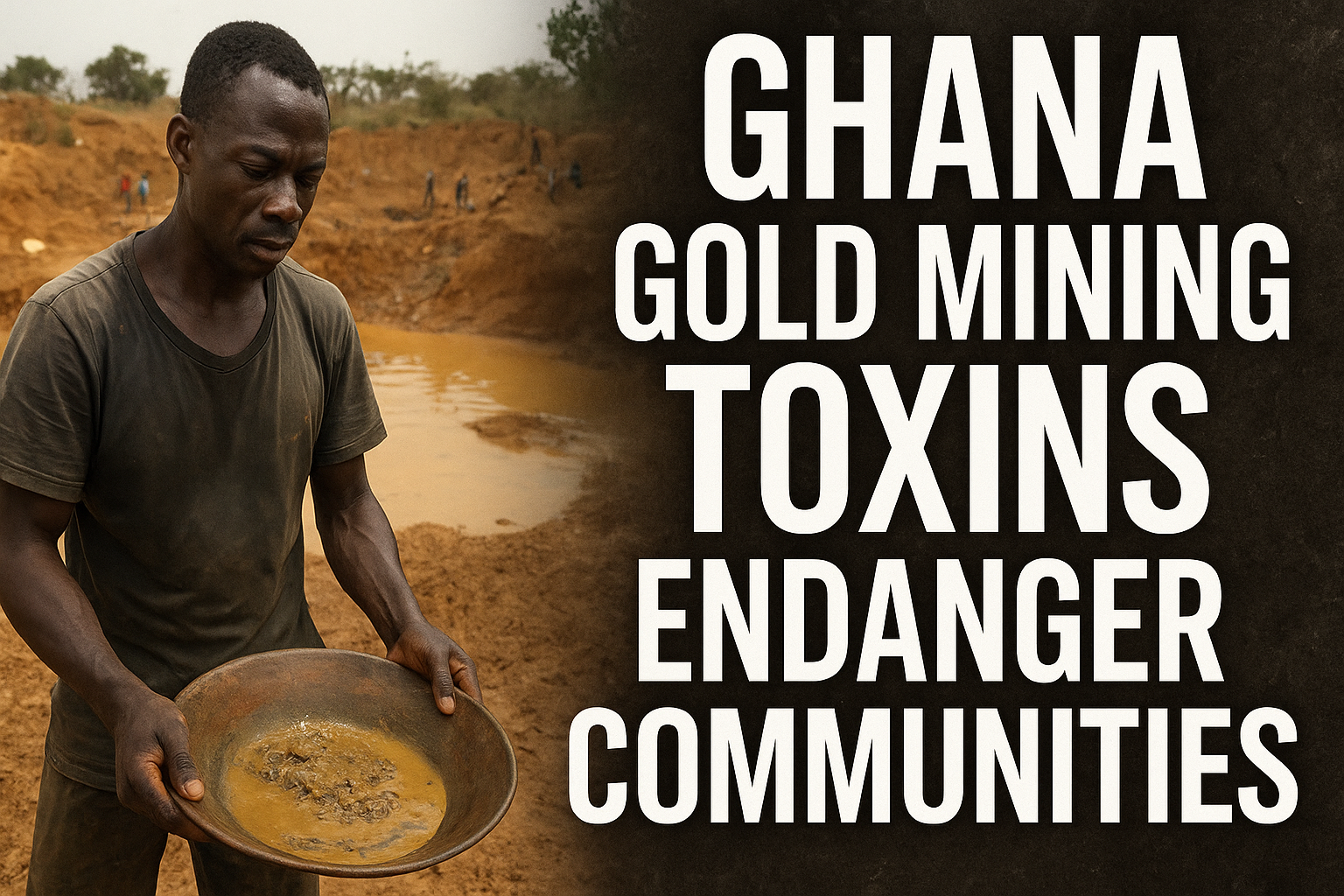Ghana Gold Mining Toxins Endanger Communities

Ghana, long dubbed the “Gold Coast of Africa,” is now grappling with a new crisis: skyrocketing levels of mercury and arsenic contamination in soils, water, crops, and human bodies. A recent study by Pure Earth and Ghana’s Environmental Protection Authority has sounded alarm bells—some readings are dozens to hundreds of times above World Health Organization (WHO) safety limits.
Table of Contents
As artisanal gold mining surges, driven by high global bullion prices, communities across major mining zones are facing invisible threats that may prove more devastating than the visible ravages of “galamsey.” This article unpacks the key findings, health implications, government responses, and what must be done now. Ghana Gold Mining Toxins Endanger Communities.
Study Findings: Toxic Levels Revealed
- The year-long research (covering six of Ghana’s 13 mining regions) found mercury levels averaging 56.4 parts per million (ppm) in soil in places like Konongo Zongo—well above the WHO safety threshold of 10 ppm. In extreme cases, readings reached as high as 1,342 ppm.
- Arsenic contamination was likewise extreme: 10,060 ppm in certain samples, over 4,000 % above recommended limits.
- The pathways of exposure include ingestion, inhalation, and dermal contact (skin absorption). The “cocktail” of heavy metals presents cumulative risks.
- Health professionals have reported increases in kidney disorders among children in affected communities, with some children already requiring dialysis. X-rays in some cases reveal mercury pellets embedded in bodies from accidental ingestion.
These findings are not just statistical anomalies—they reflect an escalating public health emergency already playing out in hospitals and clinics near mining towns. Ghana Gold Mining Toxins Endanger Communities.
Why This Is Happening: Surge in Artisanal Mining & Weak Regulation
Several converging dynamics help explain the crisis:
- Gold price boom
As global gold prices climb, countless small-scale miners (often informal) rush into mining. Production from the artisanal sector in Ghana has jumped: in the first eight months of 2025 alone, 66.7 metric tons of gold were exported, worth about $6.3 billion—already exceeding the full 2024 output. - Weak enforcement & overlapping legal/illegal mining
Though Ghana has laws banning mercury use in gold amalgamation, enforcement remains uneven. Moreover, gold flows from regulated and unregulated sources often intermingle, making it hard to distinguish or police. - Limited adoption of safer technology
Alternatives like the Gold Kacha concentrator (a device for safer gold extraction) are being promoted, but uptake is still low. Ghana Gold Mining Toxins Endanger Communities. - Institutional gaps despite new mechanisms
In early 2025, Ghana established the Ghana Gold Board (GoldBod) to regulate artisanal gold trade, enforce traceability, and reduce smuggling.
However, the scale of contamination suggests that structural and enforcement gaps remain wide.
Health & Environmental Consequences
Human Health Risks
Exposure to mercury and arsenic is not benign. Among the documented and potential effects:
- Kidney damage and failure
- Cancers (skin, lung, bladder)
- Neurological damage, especially in children (developmental delays, cognitive decline)
- Skin disorders, respiratory issues
- Bioaccumulation in local food chains: fish and crops irrigated or grown in contaminated soil may carry these toxins into diets
WHO warns that arsenic exposure is linked to skin damage, lung disease, and cancer. Mercury is a potent neurotoxin with lifelong impacts, especially on fetuses and young children. Ghana Gold Mining Toxins Endanger Communities.
Environmental Damage
- Rivers and waterways are heavily polluted, affecting aquatic life and sources of drinking water.
- Soil degradation reduces agricultural productivity and perpetuates food insecurity. Ghana Gold Mining Toxins Endanger Communities.
- Loss of biodiversity and riparian damage occur as ecosystems fail to cope with contamination.
Some media reports show rivers turning into toxic sludge and crops wilting — communities near mining zones feel the visual and tangible evidence of contamination.
Government Response & Gaps
- President Mahama has pledged crackdowns on illegal mining and created GoldBod to oversee and regulate the gold value chain. Ghana Gold Mining Toxins Endanger Communities.
- In 2025, GoldBod was allocated a revolving fund (approx. US$279 million) for operations including buying, assaying, and exporting gold from licensed artisanal miners.
- GoldBod has also uncovered a GH¢120 million gold smuggling syndicate and announced support for the National Anti-Illegal Mining Operations Secretariat (NAIMOS).
Despite these steps, critics argue:
- Enforcement is slow — illegal operations continue in many remote zones
- Community engagement is weak — local voices and traditional authorities are often sidelined
- Monitoring and remediation capacity (labs, field teams, cleanup mechanisms) is underdeveloped
- Policy–practice gap: laws banning mercury exist, but compliance is spotty
What Must Be Done: Recommendations & Call to Action
To avert deeper catastrophe, Ghana needs immediate, coordinated action across several fronts:
- Scale up monitoring & transparency
Establish an independent toxicology and environmental monitoring agency that publishes real-time data from all mining zones. - Accelerate adoption of mercury-free methods
Ramp up subsidies, training, and support for safe technologies (e.g. Gold Kacha, gravity concentration) and phase out mercury use faster. - Community mobilization & education
Empower communities and local governments to monitor, demand accountability, and adopt safer practices. Giveaway of protective gear and educational campaigns are vital. Ghana Gold Mining Toxins Endanger Communities. - Strengthen enforcement & prosecution
Equip and support NAIMOS, police, EPA, and local judiciary to act decisively against illegal miners, smugglers, and corrupt actors. - Remediation and health interventions
Launch cleanup of contaminated soils and water bodies. Provide medical screening, treatment, and monitoring for affected communities. - Legal & institutional reforms
Ensure GoldBod has real teeth (authority, budget, autonomy) and clarity in mandate. Enact stronger penalties for toxic contamination crimes. - International partnerships & funding
Seek support from global environmental funds, WHO, UNEP, and NGOs to scale remediation, research, and capacity building.
Ghana Gold Mining Toxins Endanger Communities
Ghana’s gold is meant to be a blessing—but it’s turning into a curse for vulnerable communities. The recent study unveiling dangerously high levels of mercury and arsenic underscores a turning point: unless urgent action is taken, generations will pay a price in health, livelihoods, and ecosystems.
For Ghana to survive and thrive, it must confront the silent poison now. The world is watching.

